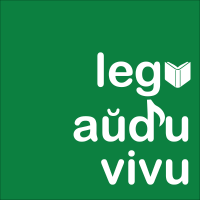Meddelanden: 64
Språk: English
Bruso (Visa profilen) 11 maj 2014 16:37:29
erinja:Is word order the only way to recognize non-Esperantized proper names in the accusative?
I experimented with "na" and "far" as a beginner. I thought "the language evolves, so there's no problem with using these new forms, it's just the language evolving"
I stopped using those words then I was fluent enough to realize that these innovations aren't really necessary, that almost no fluent speaker uses them, because a proper name with no accusative is still understood due to word order
"Johano batis Fred."
Since Johano is in the nominative, and batis is transitive, Fred must be accusative.
"Johanon batis Fred."
Now Fred is nominative.
"John batis Fred"
Well, you might say this is understood by word order, or you might just say this is ambiguous: "Ĉu vi diras 'John-on batis Fred-o' aŭ 'John-o batis Fred-on'?"
If your first language is SVO, you'd probably have to be very good at "thinking in Esperanto" to feel the ambiguity.
Are any of our readers L1 speakers of a language with flexible word order? If so, does "John batis Fred" sound ambiguous?
AllenHartwell (Visa profilen) 11 maj 2014 17:48:41
leporinjo (Visa profilen) 11 maj 2014 20:15:58
There is no single way of getting around it; there are rather many ways. Among them are:
John estis batita de Fred.
John batiĝis de Fred.
Johnon batis Fred.
Note in the third example, there's no dash- why would there need to be? It's perfectly readable without a dash. YOH-non- almost like saying "Loch Ness" without gargling.
Bruso (Visa profilen) 11 maj 2014 20:27:39
There is no ambiguity, or need to rely on word order, provided EITHER the subject or object are Esperanto or Esperantized words that have an o(j) or -o(j)n ending. I'm aware there are wordier ways to do things.
(The dashes were only to indicate the second speaker was adding endings the first speaker hadn't provided to request a resolution of ambiguity.)
leporinjo (Visa profilen) 11 maj 2014 20:29:33
Bruso:Not sure if everyone's getting my original point:They're not "wordier ways to do things", any more than it's "wordy" to use grammatically correct English or French. The example you gave of "John batis Fred" is not Esperanto... the example of "Na John batis Fred" is unofficial and unnecessary Esperanto, no less wordy than the existing alternatives. Na is one syllable; -on is one syllable. -on is already part of the language Esperanto; na is a proposal.
There is no ambiguity, or need to rely on word order, provided EITHER the subject or object are Esperanto or Esperantized words that have an o(j) or -o(j)n ending. I'm aware there are wordier ways to do things.
Bruso (Visa profilen) 11 maj 2014 20:49:21
leporinjo:The example you gave of "John batis Fred" is not EsperantoWhy? Non-Esperantized names are admissible, especially if the person involved prefers it that way. Starting with a certain Mr. Zamenhof. I don't ever recall him using Zamenhofo.
... the example of "Na John batis Fred"I gave no such example.
leporinjo (Visa profilen) 11 maj 2014 22:29:39
Bruso:Zamenhof (nominative), Zamenhofon (accusative). That was how his name was declined and how he declined every other proper name.leporinjo:The example you gave of "John batis Fred" is not EsperantoWhy? Non-Esperantized names are admissible, especially if the person involved prefers it that way. Starting with a certain Mr. Zamenhof. I don't ever recall him using Zamenhofo.
There are many ways around the problem of accusative with proper names, but ignoring it isn't proper Esperanto. The quoted example contains a transitive verb with no object. There are just two subjects: John and Fred.
Eltwish (Visa profilen) 11 maj 2014 23:27:43
leporinjo:There are just two subjects: John and Fred.I don't believe anybody is likely to interpret the sentence as such.
The PMEG offers plenty of fairly canonical examples of non-Esperantized names acting as objects without any marking. It may not be considered good style, but it certainly occurs. There is arguably some ambiguity, but I think in such cases context almost always clarifies the grammatical roles of the involved. While Esperanto has very free word order, after not much exposure to the language it becomes fairly clear that SVO is the "default" ordering, and other orderings are marked; that is, they are usually employed for a specific reason, whether stylistic or pragmatic, and not by default. This resolves the ambiguity, practically speaking. Whether a speaker of a non-SVO language will understand the intended subject has less to do with what they think is natural and more to do with their familiarity with what is natural in Esperanto.
leporinjo (Visa profilen) 12 maj 2014 01:00:22
Eltwish:The problem is that every single one of those examples uses an Esperanto word clearly marked as nominative as the subject. For example, "Li admiras Zamenhof"- obviously Zamenhof is the object, because Li is in the nominative case.leporinjo:There are just two subjects: John and Fred.I don't believe anybody is likely to interpret the sentence as such.
The PMEG offers plenty of fairly canonical examples of non-Esperantized names acting as objects without any marking.
nornen (Visa profilen) 12 maj 2014 01:29:08
Marion => Marion'on
Grace => Grace'on

